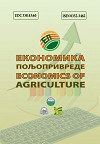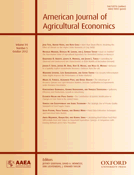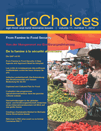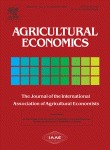
Studies in Agricultural Economics
Scope & Guideline
Connecting Research, Policy, and Practice in Agriculture
Introduction
Aims and Scopes
- Agricultural Policy Analysis:
The journal emphasizes the examination of agricultural policies at local, national, and international levels, assessing their impact on food security, rural development, and economic sustainability. - Economic Impact Studies:
Research focusing on the economic implications of agricultural practices, trade, and market dynamics is a core area, providing insights into profitability, efficiency, and market structures. - Sustainability and Environmental Economics:
There is a consistent focus on the intersection of agriculture with environmental sustainability, exploring how agricultural practices affect and are affected by ecological factors. - Technological Advancements in Agriculture:
The journal highlights studies on the adoption and impact of technological innovations in agriculture, including digitalization, precision agriculture, and sustainable farming practices. - Food Security and Nutrition:
Research addressing the complexities of food security, including supply chain dynamics, food price volatility, and socio-economic factors influencing nutrition is a significant area of focus.
Trending and Emerging
- Impact of Geopolitical Conflicts:
There is a growing emphasis on analyzing the effects of conflicts, such as the Russia-Ukraine war, on agricultural markets, trade logistics, and food security, which has become increasingly relevant. - Digitalization and Technology Adoption:
Research exploring the implications of digital tools and technologies in agriculture is on the rise, reflecting the industry's shift towards smart farming and data-driven decision-making. - Climate Change Adaptation Strategies:
The journal is increasingly focusing on studies that examine the agricultural sector's adaptation to climate change, exploring innovative practices and policies to enhance resilience. - Consumer Behavior and Food Preferences:
Emerging themes related to consumer preferences, particularly in the context of local and organic food markets, are gaining traction as food systems evolve and consumers become more health-conscious. - Food Price Volatility and Economic Responses:
There is a heightened interest in understanding the factors driving food price inflation and the economic implications of such volatility, especially in light of recent global events.
Declining or Waning
- Traditional Agricultural Practices:
Research on conventional farming methods and their economic evaluations has decreased, as the focus shifts towards sustainability and innovative agricultural practices. - Static Market Analysis:
Studies that solely rely on traditional market analysis without considering the impacts of digitalization and global disruptions (like pandemics or conflicts) are becoming less common. - Regional Specificity in Research:
There has been a noticeable reduction in papers focusing exclusively on specific regional agricultural issues, as the journal increasingly seeks to address broader, more global themes. - Historical Agricultural Economic Models:
The use of historical models for predicting future agricultural economic trends is waning, with a growing emphasis on real-time data and adaptive modeling approaches. - Labor-Intensive Agricultural Studies:
Research centered on labor-intensive agricultural practices is declining, likely due to a shift towards mechanization and technological solutions in the agricultural sector.
Similar Journals

Ekonomika Poljoprivreda-Economics of Agriculture
Championing Open Access Research in Agricultural EconomicsEkonomika Poljoprivreda-Economics of Agriculture is a pivotal journal in the field of agricultural economics, dedicated to advancing knowledge and research in this critical area of study. Published by the Balkan Scientific Association of Agrarian Economists, this esteemed journal plays a vital role in disseminating Open Access research since 2014, ensuring that findings are accessible to a global audience. With its ISSN 0352-3462, the journal focuses on a diverse range of topics within agricultural economics, aiming to bridge theoretical frameworks with practical applications that address contemporary challenges in the sector. The journal's commitment to fostering scholarly communication makes it an essential resource for researchers, professionals, and students interested in the evolution of agricultural practices and policies. Readers can expect high-quality, peer-reviewed articles that not only contribute to academic discourse but also inform real-world agricultural strategies.

AMERICAN JOURNAL OF AGRICULTURAL ECONOMICS
Exploring the Nexus of Agriculture and EconomicsThe American Journal of Agricultural Economics, published by Wiley, stands as a premier peer-reviewed journal in the fields of Agricultural and Biological Sciences and Economics and Econometrics. Established in 1919, this esteemed journal has a history of contributing significant research and insights that shape agricultural policies and economic frameworks. With an impressive Q1 ranking in both stated categories and maintaining a notable standing in the Scopus rankings—Rank #7 out of 193 in Agricultural and Biological Sciences and Rank #71 out of 716 in Economics—this journal is recognized for its high-quality scholarship and impactful research findings. Researchers, professionals, and students alike will find a wealth of knowledge within its pages, addressing critical issues in agricultural economics and providing cutting-edge analyses that inform both theory and practice. Stay ahead of the curve in this dynamic field by engaging with the American Journal of Agricultural Economics, where future trends and innovative solutions meet scholarly excellence, enriching our understanding of the agricultural economy.

EuroChoices
Illuminating contemporary issues through rigorous research.EuroChoices, published by WILEY, is a leading journal in the fields of economics and geography, demonstrating a significant impact as evidenced by its exceptional rankings—Q1 in both Economics, Econometrics and Finance and Geography, Planning and Development for 2023. With an ISSN of 1478-0917 and an E-ISSN of 1746-692X, this esteemed journal has been a pivotal platform for scholarly discourse since its inception in 2003, evolving thoughtfully to encompass contemporary issues and trends through 2024. Situated in the United States, it serves as an essential resource for researchers, professionals, and students alike, offering insights that bridge economic theories with geographical perspectives. While it maintains a traditional publishing approach without open access options, the journal continues to thrive, achieving high ranks in Scopus—with Economics positioned 37th out of 242 and Geography at 151st out of 821—highlighting its role as a critical contributor to the academic community.

Economia Agraria y Recursos Naturales
Transforming Insights into Action for Natural Resource SustainabilityEconomia Agraria y Recursos Naturales, published by UNIV POLITECNICA VALENCIA, EDITORIAL UPV, is a prominent open-access journal that has been serving the fields of agricultural and biological sciences, environmental science, and geography since 2001. With an ISSN of 1578-0732 and an E-ISSN of 2174-7350, this journal is dedicated to publishing high-quality research that contributes to the sustainable management of natural resources and agricultural practices. The journal invites scholars, practitioners, and students to explore and share innovative findings that address pressing environmental challenges. While currently categorized in the lower quartiles (Q4) for various disciplines in 2023, its open-access model ensures wide dissemination and visibility for authors and their work, aligning with the growing trend towards accessibility in academic publishing. Positioned in Spain, Economia Agraria y Recursos Naturales is a valuable resource for those seeking to engage with the intersection of agriculture, environmental studies, and policy planning within a global context.

AGRICULTURAL ECONOMICS
Exploring the nexus of economics and agronomy.AGRICULTURAL ECONOMICS, published by Wiley, is a premier journal dedicated to advancing the understanding of agricultural economics, with an ISSN of 0169-5150 and an E-ISSN of 1574-0862. This esteemed publication serves as a vital resource for researchers, professionals, and students in the fields of Agronomy and Crop Science, as well as Economics and Econometrics, consistently reflecting its high standing as evidenced by its 2023 Q1 ranking in both categories. With a comprehensive scope spanning from 1986 to 2024, the journal presents rigorous analysis and innovative research that informs policy decisions and enhances agricultural practices globally. Although it does not provide open access options, the rich academic content invites a dedicated readership committed to strengthening the agricultural sector through evidence-based insights. The journal is particularly noted for its impressive Scopus rankings, placing it among the top-tier resources for understanding the complex interplay between economic theory and agricultural development.

Journal of Agriculture and Environment for International Development
Cultivating Knowledge for International DevelopmentJournal of Agriculture and Environment for International Development, published by AGENZIA ITALIANA COOPERAZIONE SVILUPPO-ITALIAN DEV COOP AGENCY, is a vital platform advancing research at the intersection of agricultural practices, environmental sustainability, and international development. Since its inception, this Open Access journal has aimed to disseminate knowledge and innovative strategies that address global challenges in the agri-environment sector. With ISSN 2240-2802, this esteemed publication is situated in Italy and has maintained an unwavering commitment to accessibility since 2011, encouraging widespread engagement amongst researchers and practitioners. Although currently ranked in the Q4 quartile across various categories including Agricultural and Biological Sciences and Environmental Science, the journal is dedicated to covering crucial topics that contribute to sustainable development, thus serving as an invaluable resource for scholars and policymakers alike. The convergence years from 2016 to 2024 reflect the journal's adaptive approach to evolving global trends, ensuring its relevance in a rapidly changing academic landscape.

Agricultural and Resource Economics-International Scientific E-Journal
Exploring sustainable solutions for a changing world.Agricultural and Resource Economics-International Scientific E-Journal is a leading open-access publication dedicated to advancing the fields of agricultural and resource economics. Published by the esteemed INST EASTERN EUROPEAN RESEARCH & CONSULTING since 2015, this journal provides a vital platform for innovative research and discourse, particularly within the context of Eastern Europe. With an impressive Q2 ranking in Agricultural and Biological Sciences and Q3 rankings in both Business, Management and Accounting and Marketing, it serves as a key resource for academics and practitioners alike, fostering collaboration and knowledge exchange. The journal's commitment to accessibility and inclusivity is evident through its open-access policy, allowing researchers from around the globe to share and benefit from cutting-edge findings. Set against the backdrop of a rapidly evolving agricultural landscape, this journal plays a crucial role in exploring the intersection of economics, sustainability, and resource management, making it an essential read for anyone invested in the future of these critical fields.

Journal of Agricultural Sciences
Empowering research, fostering agricultural innovation.Journal of Agricultural Sciences is an esteemed peer-reviewed journal dedicated to advancing research and knowledge in the field of agricultural and biological sciences. Published by Sabaragamuwa University of Sri Lanka, this journal has been an open access platform since 2005, providing valuable insights and innovative findings to a global audience. With an ISSN of 1391-9318 and an E-ISSN of 2386-1363, the journal currently holds a Q3 ranking in the Agricultural and Biological Sciences category, reflecting its commitment to maintaining high standards of scholarship. The journal's Scopus ranking places it at #102 out of 193 in its field, signifying its impact and relevance. Covering a wide range of topics from sustainable agriculture practices to advancements in biological research, the Journal of Agricultural Sciences serves as a crucial resource for researchers, professionals, and students alike, fostering knowledge exchange and promoting agricultural innovation. We invite you to explore our rich repository of research and contribute to the ongoing discourse in the vital area of agricultural sciences.

Agricultural and Food Economics
Driving impactful research in agriculture and food economics.Agricultural and Food Economics is a leading journal published by SPRINGERNATURE, dedicated to the advancement of research in the interconnected fields of agriculture, food systems, and economic analysis. Established in 2013 and operating under an Open Access model, this journal serves as a vital platform for scholars and practitioners to disseminate innovative findings and insights that influence policy and practice. With a notable impact reflected in its 2023 quartile rankings—Q1 in Agricultural and Biological Sciences (miscellaneous), Q2 in Economics and Econometrics, and Q1 in Food Science—this journal is recognized for its rigorous scholarly output. It ranks among the top resources in its domain, with Scopus ranks placing it in the 88th percentile for Agricultural and Biological Sciences and the 79th percentile for Economics. The journal covers a broad spectrum of topics, including sustainable agricultural practices, the dynamics of food markets, and the economic implications of food policies. Researchers, professionals, and students alike will find valuable insights and comprehensive analyses that contribute to the ever-evolving discourse on food and agriculture.

Scientific Papers-Series Management Economic Engineering in Agriculture and Rural Development
Transforming Challenges into Solutions for Rural ProgressScientific Papers-Series Management Economic Engineering in Agriculture and Rural Development is a premier open access journal dedicated to advancing the field of agricultural and rural development management. Published by the University of Agronomic Sciences and Veterinary Medicine Bucharest, this journal has been a valuable resource for researchers, practitioners, and students since its inception in 2009. With a focus on the integration of economic engineering principles into agricultural practices, the journal aims to provide innovative solutions and insights that address contemporary challenges in rural development. While the journal's H-index and specific Scopus rankings are not listed, its open access format ensures that cutting-edge research is readily available to a global audience, facilitating engagement and collaboration across disciplines. Located in the heart of Romania, the journal serves as a critical platform for disseminating impactful research and fostering dialogue in the ever-evolving landscape of agriculture and rural development.